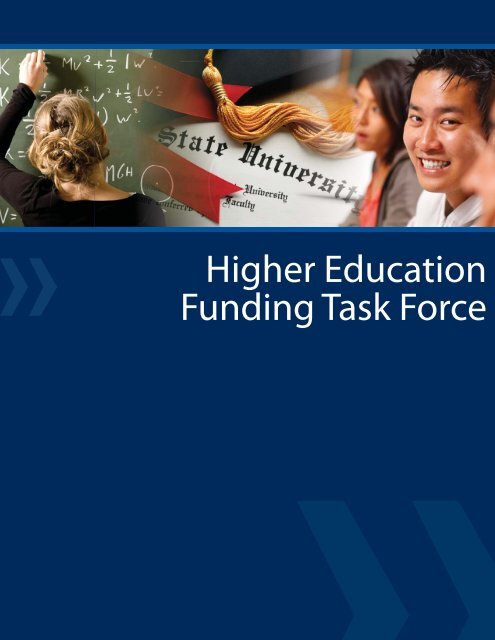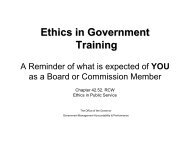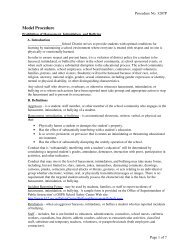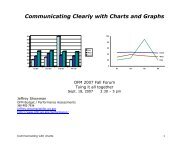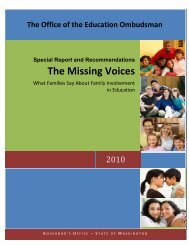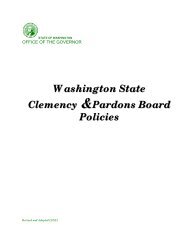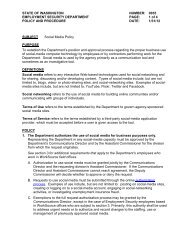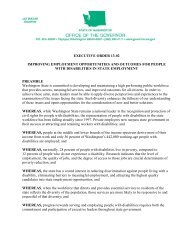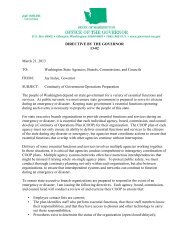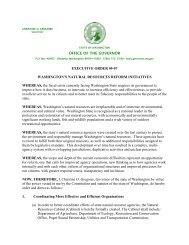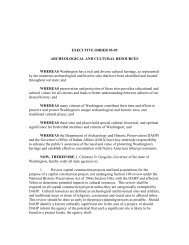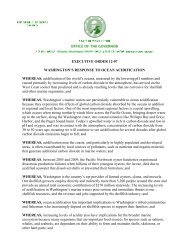Higher Education Funding Task Force
Higher Education Funding Task Force
Higher Education Funding Task Force
Create successful ePaper yourself
Turn your PDF publications into a flip-book with our unique Google optimized e-Paper software.
<strong>Higher</strong> <strong>Education</strong><br />
<strong>Funding</strong> <strong>Task</strong> <strong>Force</strong>
Dear Governor Gregoire:<br />
<strong>Higher</strong> <strong>Education</strong><br />
<strong>Funding</strong> <strong>Task</strong> <strong>Force</strong><br />
January 3, 2011<br />
Over the past eight months, our group has worked to address a critical long-term issue for Washington<br />
State – ensuring that more of the kids who grow up here have the opportunity to earn a college degree.<br />
As we come together to release this report at the start of a New Year, we believe more passionately than<br />
ever that the State needs to renew its longstanding commitment to higher education. In the short term,<br />
this will play a vital role in creating new jobs and strengthening economic recovery. In the long term, this<br />
will fundamentally improve our children’s ability to attain a prosperous standard of living in an increasingly<br />
competitive world. These twin goals – jobs and opportunity – are even more important in a time of<br />
challenging economics.<br />
The <strong>Higher</strong> <strong>Education</strong> Coordinating Board’s Master Plan calls for a 27 percent increase in the number of<br />
students receiving bachelor’s degrees by 2018. Recent economic data suggest this focus is well placed.<br />
The current state unemployment rate for residents with a college degree is less than half the rate for those<br />
with only a high school diploma. And by 2020, we expect that two-thirds of the new jobs in Washington<br />
State will require postsecondary education.<br />
The situation is clear: if we want the next generation to be successful, we need to increase the number of<br />
students graduating from college.<br />
In order to realize this goal and maintain the longstanding commitment to quality education, the State needs<br />
to modernize the financial foundation for the six public four-year universities. This will require a variety of<br />
reforms and a willingness to embrace change. The only way to do this effectively will be to share in these<br />
changes together – as students, parents, businesses, universities, and other stakeholders.<br />
First, we recommend the State adopt a new financial formula for the public four-year universities<br />
that better combines state budget support with increased flexibility for the universities to set their<br />
own tuition rates.<br />
As discussed in the report, this would better enable our four-year universities to increase per-student<br />
funding to a level at or above the 60th percentile of each institution’s global challenge state peer group.<br />
Under this formula, if state budget support grows in the future, tuition increases will be smaller. We urge<br />
HIGHER EDUCATION FUNDING TASK FORCE
the legislature to sustain its financial support for higher education in the short term and grow it in the long<br />
term. But if state funding falls short, under this formula the universities will have the flexibility to fill in the<br />
gap through higher tuition.<br />
Second, we recommend the State take an innovative and sustainable step to establish a new<br />
source of revenue to provide financial aid for low- and middle-income students who want to<br />
attend college. Specifically, we recommend the creation of a new Washington Pledge Scholarship<br />
Program.<br />
As reflected by the existing budget challenges, the current approach to financing student financial aid<br />
leaves the State ill-prepared for economic downturns. Yet students’ ability to attend college should not<br />
depend on whether the State is enjoying good economic times when they turn 18. And given the current<br />
budgetary and tax climate, it’s not feasible simply to budget more money from existing revenue sources.<br />
Instead, we need to create a new revenue source and use this to establish a long-term, sustainable<br />
foundation for financial aid.<br />
Our goal is to create over the next decade a $1 billion endowment for Washington Pledge Scholarships,<br />
funded by new, voluntary individual and business donations and incentivized by federal and state tax<br />
provisions. By establishing this as a private nonprofit fund, the State can guarantee these funds will always<br />
be used for one purpose and one purpose only – ensuring that the gates of our community colleges and<br />
public universities remain open to students of all economic backgrounds.<br />
While individuals who contribute to the endowment will benefit from a federal income tax deduction, we<br />
recommend the State create an incentive for businesses to contribute as well, by providing within specified<br />
limits a 50 percent credit on Business and Occupation and public utilities taxes. While these tax credits<br />
would be earned upon making a contribution, they would be exercisable against these taxes only when the<br />
overall revenue generated from these taxes rises above FY2008 levels.<br />
Third, we recommend concrete steps to strengthen accountability and performance by the State’s<br />
public universities.<br />
Although we share a very high regard for the existing management at all six universities, we believe it’s<br />
important to take new steps that will strengthen these areas even further. These should start with the<br />
adoption of certain mandatory measurements from the National Governors Association’s Complete to<br />
Compete effort.<br />
The State should also institute a new incentive system that borrows from both the success of<br />
Washington’s recent program for community colleges and the success of the federal government’s recent<br />
Race-to-the-Top program. This will enable the legislature to invest limited additional funds to reward<br />
campuses that help more students complete their degrees.<br />
HIGHER EDUCATION FUNDING TASK FORCE
Finally, we believe the State should encourage new plans by the four-year universities to develop action<br />
plans to meet the State’s degree completion targets.<br />
We believe these recommendations will give our families and children the educational opportunities<br />
they need and deserve. They will create a stronger financial foundation for the universities, provide new<br />
scholarships for low- and middle-income students, and provide more public accountability for our tax dollars.<br />
If combined, they will enable more young adults in Washington State to go to college, and they will help our<br />
businesses create more jobs.<br />
Sincerely,<br />
Brad Smith, Chair<br />
Senior Vice President and<br />
General Counsel, Microsoft<br />
Corporation<br />
Dean Allen, CEO, McKinstry<br />
Company<br />
Bill Ayer, Chair and CEO,<br />
Alaska Air<br />
Maud Daudon, President<br />
& CEO, Seattle Northwest<br />
Securities<br />
Charlie Earl, Director, State<br />
Board for Community and<br />
Technical Colleges<br />
Jesus Hernandez, Chair,<br />
<strong>Higher</strong> <strong>Education</strong> Coordinating<br />
Board<br />
Michael Kluse, Senior Vice<br />
President, Battelle<br />
Alex McGregor, President<br />
& CEO, The McGregor<br />
Company<br />
Laura Peterson, Vice<br />
President, Boeing Company<br />
Thomas L. “Les” Purce,<br />
President, Evergreen State<br />
College<br />
Paula Reynolds, CEO,<br />
Preferwest LLC<br />
Chris Rivera, President,<br />
Washington Biotechnology<br />
and Biomedical Association<br />
Paul Rosier, Executive Director,<br />
Washington Association of<br />
School Administrators<br />
Judith Runstad, Foster Pepper<br />
LLC<br />
Ray Stephanson, Mayor of<br />
Everett<br />
David Tang, Managing Partner,<br />
Asia, K&L Gates LLP<br />
HIGHER EDUCATION FUNDING TASK FORCE
<strong>Funding</strong> Our Future:<br />
A Financial Blueprint for Strengthening<br />
<strong>Higher</strong> <strong>Education</strong> in Washington State<br />
Recommendations of the Governor’s <strong>Higher</strong> <strong>Education</strong> <strong>Funding</strong> <strong>Task</strong> <strong>Force</strong><br />
Executive Summary<br />
Washington’s future economic vitality will depend on expanding access to high-quality postsecondary<br />
education. By 2018, two-thirds of the jobs — and almost all good-paying jobs — will require workers with<br />
college degrees.<br />
The <strong>Higher</strong> <strong>Education</strong> <strong>Funding</strong> <strong>Task</strong> <strong>Force</strong> was appointed by the Governor to develop a plan for tackling<br />
this challenge.<br />
In the long term, Washington needs to renew and reshape its commitment to higher education and make<br />
sure the next generation is equipped to compete for the best jobs available. In the short term, the state<br />
must embrace a new way of delivering higher education, with a new incentive system that ties college<br />
graduates to state funds, a new source of revenue for college scholarships, and improved accountability<br />
at all six public universities.<br />
The <strong>Higher</strong> <strong>Education</strong> <strong>Funding</strong> <strong>Task</strong> <strong>Force</strong> recommends:<br />
• Increasing the number of Washington residents graduating with bachelor’s degrees from<br />
Washington’s colleges and universities, especially in high demand fields — science, technology,<br />
engineering, and math.<br />
• Providing the universities with increased flexibility to set tuition — linked to the level of state support<br />
and to the tuition charged by each institution’s peer colleges.<br />
• Expanding financial assistance to low- and middle- income students through a combination of private<br />
and public strategies, including a $1 billion endowment fund and tax incentives.<br />
• Holding each public university accountable for graduating more students with bachelor’s degrees,<br />
giving incoming students credit for high school coursework, community college studies and prior<br />
learning experiences, and revamping some academic programs.<br />
HIGHER EDUCATION FUNDING TASK FORCE
<strong>Higher</strong> <strong>Education</strong><br />
<strong>Funding</strong> <strong>Task</strong> <strong>Force</strong><br />
Challenges<br />
The issues confronting our state are:<br />
• Washington’s future economic vitality will depend on expanding access to high-quality postsecondary<br />
education. By 2018, two-thirds of the jobs will require workers with college degrees. According to a<br />
fall 2010 study by the Georgetown University Center on <strong>Education</strong> and the Workforce, Washington<br />
will rank 6th in jobs that require postsecondary education or special training.<br />
• Washingtonians who have only a high school degree have more difficulty finding work during the<br />
recession. In 2009, the average unemployment rate for individuals with a bachelor’s degree and<br />
higher was 4.6 percent, while the unemployment rate for those with only a high school diploma was<br />
10.5 percent.<br />
• The legislature’s commitment to making higher education a top priority in future state budgets is essential,<br />
as Washington’s economic vitality relies on a robust college system, even in difficult financial times.<br />
• Helping more students complete bachelor degrees will depend on the collaborative efforts of the<br />
education system to prepare our children for college, including preparation in K-12 and academic<br />
transfers from community colleges and technical schools.<br />
Washingtonians with a Bachelor’s Degree or More <strong>Education</strong><br />
are Less Likely to be Unemployed<br />
Chart 1<br />
<strong>Education</strong>al Level 2009 Washington Average Unemployment Rate<br />
Bachelor’s Degree or <strong>Higher</strong> 4.6%<br />
Some College or Assoc. Degree 7.7%<br />
High School Diploma 10.5%<br />
Less than High School Diploma 10.8%<br />
Nationally, Income Increases with <strong>Education</strong>al Attainment<br />
Chart 2<br />
Professional<br />
Doctorate<br />
Master’s<br />
Bachelor’s<br />
Associate’s<br />
Some College<br />
HS Graduate<br />
Some High School<br />
HIGHER EDUCATION FUNDING TASK FORCE<br />
Source: Bureau of Labor Statistics; Current Population Survey. 2009 Geographic Profile of the Employed and<br />
Unemployed. Compiled by the Washington State Employment Security Department.<br />
$70,186<br />
$57,181<br />
$39,746<br />
$33,009<br />
$31,286<br />
$21,484<br />
$95,565<br />
$120,978<br />
Source: U.S. Census Bureau, Current Population Survey. 2007.
Initial Charge<br />
The <strong>Task</strong> <strong>Force</strong> was asked to:<br />
• Develop a realistic and viable long-range funding strategy that provides Washington’s students<br />
with affordable higher education opportunities.<br />
• Recommend ways to improve accountability and performance in our public four-year higher<br />
education institutions to ensure we get the highest value for the State’s and student’s investment.<br />
And,<br />
• Consider whether the higher education system’s current governance model should be modified<br />
to improve overall performance and accountability. (Note: The <strong>Task</strong> <strong>Force</strong> decided not to address<br />
governance issues in order to focus its efforts on funding and other measures that will improve<br />
accountability.)<br />
Recommendation 1:<br />
Over the next decade, our higher education system must create the opportunities for more Washington<br />
residents to earn bachelor’s degrees.<br />
The following bachelor’s degree completion targets should be set for 2018:<br />
• Increase the number of bachelor’s degrees by 2018: Washington’s six public universities should<br />
graduate at least 6,000 more Washington resident students with bachelor’s degrees annually in 2018<br />
than they did in 2010. This recommendation, which is in sync with the <strong>Higher</strong> <strong>Education</strong> Coordinating<br />
Board’s goal in the 2008 Master Plan, represents a minimum threshold for the bachelor’s degree<br />
production our economy needs. In 2010, more than 22,000 students earned bachelor’s degrees at<br />
our public universities. By 2018, more than 28,000 students, or an increase of 27 percent, should be<br />
graduating with bachelor’s degrees.<br />
• Increase degrees in science, technology, engineering, and mathematics: Washington’s six public<br />
universities should see 2,000 more Washington<br />
resident students graduating annually with bachelor’s<br />
degrees in science, technology, engineering, and<br />
mathematics (STEM). This would represent roughly<br />
a 40 percent increase compared to current STEM<br />
degrees. Of the 22,000 bachelor degrees awarded at<br />
our public universities in 2010, just over 5,000 were<br />
earned in these academic areas.<br />
Washington Ranks 36th in the<br />
Nation in the Production of<br />
Bachelor’s Degrees<br />
All institutions, public and private,<br />
among 18-24 year olds.<br />
Source: U.S. Department of Commerce. 2006.<br />
Compiled by the Puget Sound Regional Council.<br />
• Expand opportunity for underrepresented groups:<br />
By 2018, at least 19 percent of the bachelor degrees<br />
awarded should go to graduates from historically<br />
underrepresented groups. This percentage is based on changing demographics and our belief that<br />
college campuses must include more low-income and first-time college students.<br />
HIGHER EDUCATION FUNDING TASK FORCE
Recommendation 2:<br />
Provide sufficient investment by linking tuition and state support. This is fundamental to providing<br />
an affordable, accessible, higher quality education for Washington’s citizens and to meeting the degree<br />
and access goals for 2018. As we climb out of the recession and build for the future beginning in 2013,<br />
it’s clear that educational access and attainment can be delivered only with a realistic financing framework<br />
in place. Our universities need certainty to plan for the future. State investment and tuition must be<br />
integrated to provide predictable and stable funding as follows:<br />
• Benchmarking total per student funding: Total per-student funding is benchmarked against two<br />
figures: a baseline of the fiscal year 2011 per-student funding and an aspirational level at or above the<br />
60th percentile of each university’s global challenge state peer group.<br />
o If state funding rises to the aspirational funding level or above, tuition may be frozen or even<br />
reduced if the State provides more support. The universities would increase enrollment to meet<br />
or exceed the degree production goals.<br />
o If state funding remains at the baseline level or above, the universities will commit to<br />
continue serving fiscal year 2011 enrollment levels and tuition increases will be capped at the<br />
60th percentile of that university’s state peer group.<br />
o If state funding falls below the baseline level, in order to maintain the baseline level, the<br />
universities would have the option to reduce enrollments or increase tuition without a cap or do<br />
both.<br />
• Give universities the authority to set tuition rates: The governing boards of each university should<br />
be allowed to set tuition. The following limits would be placed on that authority:<br />
o If state funding is at or above the baseline, tuition cannot exceed the 60th percentile of that<br />
university’s state peer group. A percentage of tuition increases shall be dedicated to financial aid.<br />
o If state funding falls below the baseline, in order to maintain the baseline level, the institutions<br />
would have the option to reduce enrollments or could increase tuition without a cap, or do both.<br />
o Tuition may go down if the aspirational funding level is exceeded.<br />
HIGHER EDUCATION FUNDING TASK FORCE
Recommendation 3:<br />
Help low- and middle-income Washington students earn a bachelor’s degree by creating the<br />
Washington Pledge Scholarship Program.<br />
• Establish the Washington Pledge Scholarship: A new endowment program should be created<br />
with a goal of raising $1 billion by the end of this decade as a legacy that will help future generations<br />
of Washington students attend college. This scholarship will provide much needed help for low- to<br />
middle-income Washington students at our public two- and four-year colleges and universities.<br />
• This endowment would be created with new money and would come from new sources of<br />
revenue. Private donations from both individuals and business will fund the endowment. In working<br />
through the details to create this fund, consideration should be given to enabling donations to target<br />
specific programs or students, potentially with a special priority for students who want to pursue<br />
STEM degrees.<br />
o Individual Donations: The endowment should accept individual donations and should be set up<br />
as a nonprofit to qualify for federal tax deductions. This structure would help incentivize individual<br />
donations and ensure that the endowment will always be used for these scholarships and for no<br />
other purpose. The <strong>Higher</strong> <strong>Education</strong> Coordinating Board could administer the program.<br />
o Business Donations: The endowment should also accept contributions from the business<br />
community. The State should establish a credit equal to 50 percent of the amount donated to<br />
be applied against the Business and Occupation tax and public utilities tax that could be earned<br />
under the new program. This would both create a financial incentive for businesses to make<br />
these new voluntary donations and, in effect, enlist State resources to help build a sustainable,<br />
long-term financial foundation for the education of future generations.<br />
• Given current State budget challenges, we need to take a pragmatic approach to the timing<br />
and recognition of this tax credit. We recommend that the credit could be earned upon<br />
making the contribution but could not be claimed until state sales, use and Business &<br />
Occupation tax collections exceed FY 2008 collections by 10 percent and would not be<br />
available earlier than January 1, 2014. The credit would be a percentage of the amount<br />
donated. A cap would be placed on the amount of credit that could be claimed in a year both<br />
under the program and by a single business.<br />
HIGHER EDUCATION FUNDING TASK FORCE
Recommendation 4:<br />
Strengthen accountability and performance in higher education.<br />
Through specific accountability measures, improved performance and recognizing credits earned,<br />
students will be better served.<br />
• Adopt the National Governors Association’s Complete to Compete measures: Washington<br />
should adopt the association’s Complete to Compete indicators as statewide accountability<br />
measures. This will provide universities and the state a way to collect comparable data to make<br />
better policy decisions, pinpoint areas for improvement, and measure success.<br />
o The measures include:<br />
HIGHER EDUCATION FUNDING TASK FORCE<br />
• Outcome metrics: Degrees awarded, graduation rates, transfer rates, and time and credits to<br />
degree.<br />
• Progress metrics: Enrollment in remedial education, success in remedial education, success<br />
in first-year college courses, credit accumulation, retention rates, and course completion.<br />
• Develop an incentive system for improved accountability and performance: The legislature should<br />
also create limited financial incentives to reward progress by the six public universities in meeting<br />
bachelor degree completion targets. In designing the system, the State should clearly articulate each<br />
individual university’s role and action plan. Each university should be required to participate in the<br />
incentive system. The <strong>Higher</strong> <strong>Education</strong> Coordinating Board should design and oversee the incentive<br />
program. Incentive awards should be provided for progress based on the following:<br />
o Increases in the number of degrees awarded in the physical and health sciences, technology,<br />
engineering, and mathematics.<br />
o Increases in the retention of first-year students receiving need-based assistance.<br />
o Time and credit to degree, including a reduction in the number of credits accrued beyond what is<br />
required to earn a bachelor’s degree.<br />
o Total number of bachelor’s degrees awarded.<br />
• Have universities develop action plans to meet goals and reduce costs. The State should<br />
encourage the universities to develop action plans that specify degree completion targets, the<br />
action steps taken to reach the targets, and the results. Results should be reported annually to the<br />
legislature. The potential menu of options could include but not be limited to:<br />
o Innovative use of technology in instruction, particularly for large introductory courses.<br />
o Increasing administrative efficiencies among the universities and campuses.<br />
o Eliminating under-used majors and courses.<br />
o Creating three-year bachelor degree programs.<br />
o Limiting state support for students taking credits beyond those needed to earn a degree.
o Recognizing prior learning experiences based on competency assessments.<br />
o Recognizing advanced high school work, such as advanced placement or international<br />
baccalaureate courses with proficiency exams and college credits earned in high school through<br />
programs such as Running Start.<br />
o Recognizing transfer credits – particularly credits earned in academic programs at two-year or<br />
four-year institutions.<br />
• Recognize credit from high school and other colleges: Students should receive credit at the six<br />
public universities for college-level work completed at a high school, a community college or another<br />
four-year university.<br />
o College credit earned in high school: The universities should be required to have uniform<br />
policies for awarding credit to high school students who successfully complete college-level<br />
work through Running Start or college in the high school programs. The universities should also<br />
have uniform policies for awarding credit to high school students who successfully complete<br />
both the coursework and exams in advanced placement or international baccalaureate programs.<br />
The universities should make information widely available to students about the ability to earn a<br />
college degree in three years after high school when a high school student completes academic<br />
work qualifying for college credit.<br />
o Transfer of credits: The universities should be required to provide for a seamless transfer<br />
process and maximize academic credits earned at other institutions of higher education.<br />
o Prior learning experiences: The universities should be required to strengthen policies for<br />
awarding credit for prior learning experiences with demonstrated competencies through<br />
proficiency exams. Information about proficiency exams to earn college credit should be<br />
consistent and widely available.<br />
HIGHER EDUCATION FUNDING TASK FORCE
<strong>Higher</strong> <strong>Education</strong><br />
<strong>Funding</strong> <strong>Task</strong> <strong>Force</strong><br />
Members:<br />
Brad Smith, Chair, Senior Vice President and General Counsel, Microsoft Corporation<br />
Dean Allen, CEO, McKinstry Company<br />
Bill Ayer, Chair and CEO, Alaska Air<br />
Maud Daudon, President & CEO, Seattle Northwest Securities<br />
Charlie Earl, Director, State Board for Community and Technical Colleges<br />
Jesus Hernandez, Chair, <strong>Higher</strong> <strong>Education</strong> Coordinating Board<br />
Michael Kluse, Senior Vice President, Battelle<br />
Alex McGregor, President & CEO, The McGregor Company<br />
Laura Peterson, Vice President, Boeing Company<br />
Thomas L. “Les” Purce, President, Evergreen State College<br />
Paula Reynolds, CEO, Preferwest LLC<br />
Chris Rivera, President, Washington Biotechnology and Biomedical Association<br />
Paul Rosier, Executive Director, Washington Association of School Administrators<br />
Judith Runstad, Foster Pepper LLC<br />
Ray Stephanson, Mayor of Everett<br />
David Tang, Managing Partner, Asia, K&L Gates LLP<br />
1 | HIGHER EDUCATION FUNDING TASK FORCE


